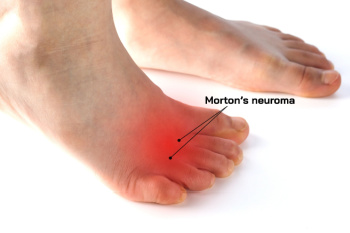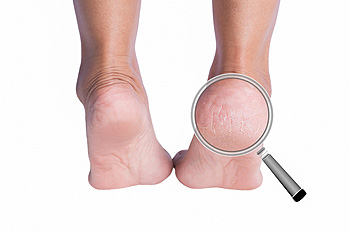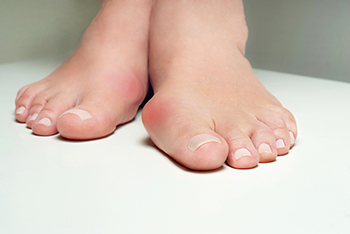Connect With Us
Blog

Morton’s neuroma affects the ball of the foot, often occurring between the third and fourth toes. Morton’s neuroma develops when the plantar digital nerve becomes compressed. This leads to thickened tissue and causes sharp or burning pain, numbness, or the sensation of a pebble inside the shoe. Exercises can help by improving foot strength, flexibility, and alignment to reduce pressure on the nerve. Toe-spreading exercises encourage natural toe positioning, while stretching the big toe and calf muscles can relieve tension in the forefoot. Strengthening exercises, such as towel curls and single-leg balance drills, help stabilize the foot and distribute weight more evenly during movement. Rolling a ball under the arch of the foot may also aid in reducing discomfort. While these exercises may provide relief, persistent symptoms should not be ignored. A podiatrist can evaluate your symptoms, recommend orthotic support if necessary, and determine whether additional treatment is required. If you have symptoms of Morton's neuroma, it is suggested that you schedule an appointment with a podiatrist for an exam, diagnosis, and treatment options.
Morton’s neuroma is a very uncomfortable condition to live with. If you think you have Morton’s neuroma, contact one of our podiatrists of East Ocean Podiatry . Our doctors will attend to all of your foot care needs and answer any of your related questions.
Morton’s Neuroma
Morton's neuroma is a painful foot condition that commonly affects the areas between the second and third or third and fourth toe, although other areas of the foot are also susceptible. Morton’s neuroma is caused by an inflamed nerve in the foot that is being squeezed and aggravated by surrounding bones.
What Increases the Chances of Having Morton’s Neuroma?
- Ill-fitting high heels or shoes that add pressure to the toe or foot
- Jogging, running or any sport that involves constant impact to the foot
- Flat feet, bunions, and any other foot deformities
Morton’s neuroma is a very treatable condition. Orthotics and shoe inserts can often be used to alleviate the pain on the forefront of the feet. In more severe cases, corticosteroids can also be prescribed. In order to figure out the best treatment for your neuroma, it’s recommended to seek the care of a podiatrist who can diagnose your condition and provide different treatment options.
If you have any questions, please feel free to contact our office located in Deerfield Beach, FL . We offer the newest diagnostic and treatment technologies for all your foot care needs.

Skin fissures on the heels are caused by dry, cracked skin. These painful cracks can develop deep enough to bleed and are often accompanied by rough, flaky skin. Symptoms include a feeling of tightness, discomfort while walking, and visible cracks, especially in the winter months when the air is drier. The main causes of heel fissures are prolonged dryness, standing for long periods, wearing ill-fitting shoes, or not moisturizing enough. People with conditions like diabetes or obesity are also more prone to heel fissures due to added pressure on the feet. If you experience heel fissures, a podiatrist can help by assessing the severity of the cracks and offering treatment options. Included are prescription creams, padding to relieve pressure, or debridement, which is the removal of dead skin. This type of doctor may also provide advice on proper footwear and foot care routines to prevent further damage. If you have severely cracked heels, it is suggested that you schedule an appointment with a podiatrist.
If the skin on your feet starts to crack, you may want to see a podiatrist to find treatment. If you have any concerns, contact one of our podiatrists from East Ocean Podiatry . Our doctors can provide the care you need to keep you pain-free and on your feet.
Cracked Heels
It is important to moisturize your cracked heels in order to prevent pain, bleeding, and infection. The reason cracked heels form is because the skin on the foot is too dry to support the immense pressure placed on them. When the foot expands, the dry skin on the foot begins to split.
Ways to Help Heal Them
- Invest in a good foot cream
- Try Using Petroleum Jelly
- Ease up on Soaps
- Drink Plenty of Water
Ways to Prevent Cracked Heels
- Moisturize After Showering
- Skip a Shower
- Keep Shower Water Lukewarm
- Don’t Scrub Your Feet
If you are unsure how to proceed in treating cracked heels, seek guidance from a podiatrist. Your doctor will help you with any questions or information you may need.
If you have any questions, please feel free to contact our office located in Deerfield Beach, FL . We offer the newest diagnostic and treatment technologies for all your foot care needs.

Bunions are a foot condition where the big toe points toward the second toe, causing a bony bump to form at the base of the toe. They are particularly common in older women, anyone with flat feet, or people with a family history of bunions. Pregnancy can also contribute, as hormonal changes and weight gain put additional pressure on the feet. Symptoms of bunions include pain, swelling, and redness surrounding the joint, often worsened by wearing tight or narrow shoes. As the condition progresses, it can lead to difficulty walking and discomfort during daily activities. A podiatrist can diagnose the severity of the bunion and offer treatment options to reduce pain and slow progression. Conservative options include custom orthotics, padding, or changes to footwear. In more severe cases, surgery may be needed to realign the toe. If you have a bunion, it is suggested that you schedule an appointment with a podiatrist for proper treatment.
If you are suffering from bunion pain, contact one of our podiatrists of East Ocean Podiatry . Our doctors can provide the care you need to keep you pain-free and on your feet.
What Is a Bunion?
Bunions are painful bony bumps that usually develop on the inside of the foot at the joint of the big toe. As the deformity increases over time, it may become painful to walk and wear shoes. Women are more likely to exacerbate existing bunions since they often wear tight, narrow shoes that shift their toes together. Bunion pain can be relieved by wearing wider shoes with enough room for the toes.
Causes
- Genetics – some people inherit feet that are more prone to bunion development
- Inflammatory Conditions - rheumatoid arthritis and polio may cause bunion development
Symptoms
- Redness and inflammation
- Pain and tenderness
- Callus or corns on the bump
- Restricted motion in the big toe
In order to diagnose your bunion, your podiatrist may ask about your medical history, symptoms, and general health. Your doctor might also order an x-ray to take a closer look at your feet. Nonsurgical treatment options include orthotics, padding, icing, changes in footwear, and medication. If nonsurgical treatments don’t alleviate your bunion pain, surgery may be necessary.
If you have any questions, please feel free to contact our office located in Deerfield Beach, FL . We offer the newest diagnostic and treatment technologies for all your foot care needs.
Blog Archives
- March 2025
- February 2025
- January 2025
- December 2024
- November 2024
- October 2024
- September 2024
- August 2024
- July 2024
- June 2024
- May 2024
- April 2024
- March 2024
- February 2024
- January 2024
- December 2023
- November 2023
- October 2023
- September 2023
- August 2023
- July 2023
- June 2023
- May 2023
- April 2023
- March 2023
- February 2023
- January 2023
- December 2022
- November 2022
- October 2022
- September 2022
- August 2022
- July 2022
- June 2022
- May 2022
- April 2022
- March 2022
- February 2022

